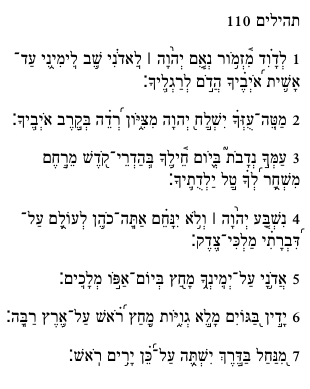"Sit at My Right Hand" -- A Sermon on Psalm 110
 Tuesday, September 30, 2014 at 09:53AM
Tuesday, September 30, 2014 at 09:53AM  A Sermon on the 110th Psalm
A Sermon on the 110th Psalm
When the authors of the New Testament sought Old Testament passages to prove to Jews that Jesus is the Christ (the Messiah), one of the passages to which they frequently turned was Psalm 110. This particular Psalm is among the most commonly quoted Psalms in the New Testament. What makes this particular Psalm so important to New Testament writers is that it unites two distinct offices which God gave to ancient Israel–that of king and priest–in a single person. But David–to whom Jesus attributes authorship of this Psalm–was of the tribe of Judah, and not a Levite (and therefore not a priest). As it turns out, the one to whom these offices both apply is David’s Lord, a mysterious messianic figure associated with yet another mysterious and shadowy figure from Israel’s ancient past, Melchizadek, who was the king of Salem, and a priest to whom Abram paid tithes.
As we continue our series on select Psalms, we now take up one of the so-called “royal Psalms” connected to Israel’s most famous king, David. We will proceed by: first, discussing the background and structure of the Psalm; second, we will then go through the Psalm; and finally, we will observe how this Psalm is utilized throughout the New Testament, where it is quoted from or alluded to by Jesus, Peter, Paul, Luke, and the author of the Book of Hebrews. Since the authors of the New Testament saw in this Psalm clear Old Testament evidence that Jesus is the Son of God and Israel’s Messiah (and the figure about whom David is actually speaking), this is a Psalm with which we ought be well familiar.
We know virtually nothing about when this Psalm was written or why–although it is ascribed to David in the title of the Psalm, a point which Jesus acknowledges when he quotes the 110th Psalm and applies it to himself. This Psalm might have been written for any number circumstances in Israel, such as a celebration of David’s authority over the twelve tribes of Israel, or even a celebration of David’s enthronement as Israel’s king. Given the fact that chief authors of the New Testament saw this Psalm as predicting a great messiah yet to come–we too should understand this Psalm as messianic. This simply means that although David composed the Psalm, and it was used for a particular occasion in Israel, the contents of the Psalm point to a kingly/priestly figure yet to come–a descendant of David who holds both the kingly and priestly offices mentioned in this Psalm.
The 110th Psalm is found in Book Five of the Psalter (which includes Psalms 107-150). This particular Psalm has a very simple structure, taking the form of two oracles (vv.1-3; and vv. 4-7), each of which speak of God’s promise (v. 1, 4) followed by an explanation of the way in which God will give his people the promised victory. Both this Psalm and the preceding (Psalm 109) are associated with David, and follow after the lament in Psalm 108:11, in which the Psalmist cries out, “have you not rejected us, O God? You do not go out, O God, with our armies.” Psalms 109 and 110 answer the question as to whether or not God has rejected his people by reminding the Israelites that God has indeed given his people a divinely-appointed king who will lead and protect them (Israel).
To read the rest of this sermon: Click Here


Reader Comments